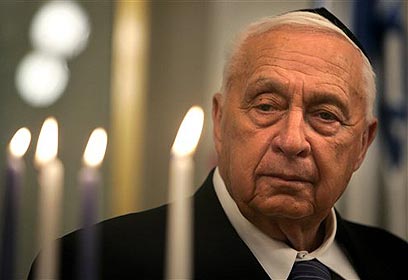
Sharon's last days as Israel's leader
Exactly one year ago Prime Minister Ariel Sharon was hospitalized for the second and last time, and went into a coma from which he never recovered. In a recently-published book, his close confidant, the late journalist Uri Dan describes Sharon's last days as Israel's leader
Dan describes the chain of events in the days leading up to January 4, 2006, the day when Prime Minister Ariel Sharon suffered a second stroke from which he never recovered.
Dan, who has been a close confidant of Sharon for several decades, describes the deterioration in the condition of the active and energetic leader.
On January 2, 2006, at 5:15 p.m., my friend called me for the last time from his car. He was going to Sycamore Farm, where he was to dine with his family. Arik was still shuttling between his office and Jerusalem and his farm in the Negev, despite the advice of his doctors, who urged him to stay near the Hadassah hospital. He detested his official apartment, where he felt like he was suffocating.
“Get well soon!” I said to him. “Forty cretins are waiting for you to get them elected to the Knesset!” Instead of losing his temper or trying to calm my “extremist” fervor, Ariel broke into the thundering laughter that so many Israeli comedians liked to imitate. No, he wasn’t fooled by the political maneuvers of his current allies. That laugh still resonates in my ears, like a cry of truth.
“How was New York?” he asked.
I had come back the previous day. I couldn’t help telling him that the hot dogs at Nathan’s, which he loved, were as delicious as ever; he laughed again, but without real enjoyment. With an operation planned for January 5, his menus were subject to strict scrutiny. He joked a lot about his first stroke, however, and the comments that it had caused. I told him that I had considered writing an article panning the members of his entourage and drawing parallels with the sketches of 'What a Wonderful Country!' (a satirical TV show) but that I had not gone ahead with it so as not to offend him.

Former Prime Minister Sharon. Sounded weak (Photo: AP)
“No, no!” he protested. “Write it; that’s really funny!”
Until his last moment of consciousness, Ariel Sharon did not spare himself. His doctors had told him to work for no more than four hours a day—impossible for a man used to 15-hour workdays. And it was useless to try to reason with him: on January 1, the Palestinians had inaugurated 2006 by firing Qassam rockets from dismantled localities in the Gaza Strip—Elei Sinai, Nisanit, Dugit—onto Jewish towns
in the Negev, and their missiles were threatening the coastal town of Ashkelon.
Nothing was working—neither the Israeli artillery canons, which targeted wasteland territories in the Gaza Strip, nor the sealing-off by the air operation “Sky Blue,” ordered after Sharon left the hospital.
'The Arabs know that I'm working'
Having built all his arguments for withdrawal on the promise of greater calm and increased protection of Israeli territory, Sharon could not tolerate such hostilities. He had won over the majority of the public to his cause by convincing them that dismantling settlements in the Gaza Strip would solve the root causes of the problem. If the rockets reached the Jewish state or led to human losses, Likud and the extreme right would rub their hands at the prospect of the approaching election.
Despite the state of his health, Ariel Sharon was incensed: he ordered the immediate liquidation of the commandos responsible for the attacks. In this kind of operation, the combined efforts of Shin Bet and the air force usually produced spectacular results. There was just one problem: The information from Palestinian sources did not reach the prime minister’s office quickly enough. Had the targets been neutralized? To put his mind at ease, Ariel met our friend, the expert on Palestinian affairs, on Monday January 2, 2006, at around 9 p.m..
“What do the Arabs say?” Sharon asked.
The expert consulted his sources and confirmed the news: Sayid Abed-El Fatah Ibrahim Judyan, 41, head of the al-Qods brigade, the armed wing of Islamic Jihad and instigator of rocket attacks and suicide attacks, had indeed been liquidated. A missile had struck his car at Jabalya in the Gaza Strip, killing him with one of his lieutenants. A third individual, himself implicated in terrorist activities, had been seriously wounded (he eventually died of his wounds).
A statement from Islamic Jihad announced, “We will avenge Judyan. Our reaction will be swift and painful. Sharon should know that Judyan’s liquidation will not win votes for Kadima.”
Satisfied with the turn of events, Sharon said mockingly, “Good, the Arabs know that I’m working.” And then he added, “I’m getting stronger and stronger.”
Nothing could have been further from the truth. The incessant comings and goings of secretaries, advisers, bodyguards, doctors and nurses around him created an impression of dynamism that masked his weakening health.
Everyone thought that he was invincible— above all me, who had seen him survive so many personal, military and political fights, even if I had detected signs of weariness in him. Scorning the most basic caution, Sharon devoted what remained of his energy to protecting his land, his country and his people. Perhaps he also threw himself into work in this manner in order to silence the anxiety that welled inside him.
The prospect of surgery under general anesthetic on January 5 hardly pleased him, but the doctors assured him that the operation would last only three hours. His habitual optimism reigned. He was so sure that he would be able to carry out his mission that he never thought of designating an “heir,” whether moral or political.
'His voice was weak'
On Wednesday January 4, 2006, Sharon spent the evening at Sycamore Farm with his son Gilad, his daughter-in-law Inbal and his three grandsons. He spoke on the phone with chief of staff General Dan Halutz, and they discussed how a Hamas terrorist training camp in the Gaza Strip could be neutralized.
His voice was weak, and the general thought that his words were confused. At around 10 p.m. a mutual friend called me in alarm: “Arik was taken by ambulance to the Hadassah Ein Kerem Hospital. The neurosurgical department is on alert.”
Horrified, I turned on the television. They were showing the ambulance driving toward Jerusalem. Through the vehicle’s rear window, one could discern Ariel Sharon’s face, recognized by everyone: the face of the formidable prime minister of Israel, his head crowned with a white mane, the great leader of the Jewish people and the man I had known for 52 years.
The hospital announced that he had had a stroke. The operation lasted several hours and was followed by another. And yet another. Seven operations in total. “The doctors have killed Arik,” my wife Varda said in a strangled voice.
I didn’t try to hold back the tears that were streaming down my face. They have not yet dried.
- Journalist Uri Dan passed away on December 24, 2006. Former Prime Minister Ariel Sharon is hospitalized at the Sheba Medical Center.










